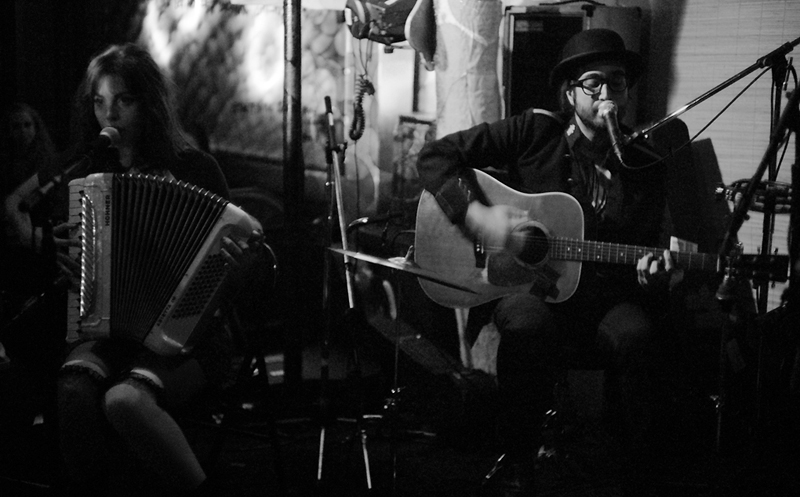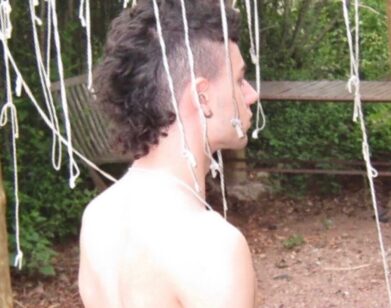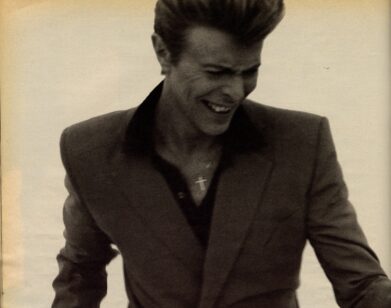Postmodern Love: Charlotte Kemp Muhl and Sean Lennon

CHARLOTTE KEMP MUHL (LEFT) AND SEAN LENNON
PERFORM IN NEW YORK LAST NIGHT
PHOTO BY AARON STERN
Call it putting the cart before the horse, but couple Charlotte Kemp Muhl and Sean Lennon’s decision to collaborate musically came after they had already christened themselves The Ghost of a Saber Tooth Tiger. “It was a play that Charlotte wrote when she was a kid, and I found it under her bed when we first started dating,” Lennon says. “I thought it was a cool title, so we started the band with a name.” With that, they wrote their first song, “The World Was Made for Men,” and thus brought into being The Ghost of a Saber Tooth Tiger’s debut effort (and no doubt labor of love), Acoustic Sessions, out this week on Kemp Muhl and Lennon’s Chimera Records.
KATIE MENDELSON: How did messing around with songs turn into Acoustic Sessions?
SEAN LENNON: The album came about because we had been making an electric record with a full band, and all our friends who had heard our first song said before we put out a fully electric record we should put out an acoustic record to capture the way the band started, just Charlotte and I in her bedroom writing songs and playing guitar. So before we evolved into a fully realized rock band, we decided to just capture the birth of the band and do an acoustic album.
MENDELSON: Was it an awkward transition in your relationship to start making music together, or was it something that came naturally?
KEMP MUHL: I think it would have been more awkward if we weren’t doing it. Because we led such traveling, nomadic lives, we would have been going in opposite directions if we hadn’t aligned our paths like that. We’re both such creative people that there’s not really a line between our personal lives and what we do for work. It felt the most natural to start playing together.
MENDELSON: What have been the biggest influences on your music?
KEMP MUHL: Everything from the Victorian era, to science fiction films, to the macabre, psychedelia and realism.
LENNON: We basically like all the same things, from film, to literature, to music, to poetry and art. In the beginning of our relationship, before we started Chimera Music and before we had day jobs, we used to go on bird watching expeditions; hiking Mount Fuji and nature excursions in strange places like the tundra and Iceland. We really did a lot of adventurous stuff, and our songs are an amalgamation of our disparate experiences and interests and things that we’re reading and experiencing. Now we have a day job, so we really don’t have any fun, all we do is just try to run the label.
MENDELSON: [LAUGHS] I’m sure. There is definitely a strange mixture of all those disparate interests, and there’s definitely a theme of dissonance in the album.
LENNON: We’re really obsessed with what people call dissonance, but I think once you acclimate to a certain amount of dissonance, it stops sounding dissonant, especially with certain chords. After a while playing chords like that, they start to sound harmonious. We’re at the point where all of those dissonant notes and scales and chords actually just sound like different colors of beauty to us. We’re sort of preoccupied with those strange notes and strange chords because they’re like weird foreign films or something, movies that are slightly odd, like Fellini films, and we really like that.
MENDELSON: Do you feel like this music is a departure from what you’ve made in the past?
LENNON: In the past, I never realized it, but I was sort of an island, and I was writing songs about my feelings and I was controlling everything and producing my own music. It was really interesting and probably an important part of my musical growth, but it wasn’t until I had a writing partner that I realized how fun and exciting songwriting can be. Now I’m able to collaborate and write songs that are not necessarily just about my view of the world, but that are a creative and collaborative fantasy.
MENDELSON: How do you deal with the inevitable comparisons drawn between the two of you and Sean’s parents?
KEMP MUHL: We’re different people, and it’s a very different time, and we write different music. It’s not politically charged. The way we write is very different. His parents very rarely actually wrote a song together, they would just inform each other’s songs. A lot of people don’t realize that, but there’s only one or two songs where their names are both on the writing credits. Sean and I do things very differently. We’ll write every word together and chords together and it’s really a mind-melding process, which is different than the way his parents were.
LENNON: We also just never really thought about it. The truth is that the comparison never occurred to us until way after we started the band. I was actually really surprised because I’ve been compared to my dad my whole life, but I never thought that Charlotte, who is a white girl from Atlanta, Georgia, would be compared to my Japanese mother—they’re just nothing alike. So I was actually really amazed that people managed to make that comparison. I was shocked. [LAUGHS]
MENDELSON: Can you describe your sound?
LENNON: All of our song titles and all of our lyrics represent our aesthetic, which is a combination of really old things, antiquated subject matter with really postmodern subject matter. That’s why our next record is going to be called Victorian Cyborg, a combination of the Victorian era aesthetic with a postmodern, technologic diatribe.
MENDELSON: I think that’s part of the theme of dissonance—these folksy sounds mixed with futuristic, dystopic lyrics.
KEMP MUHL: We think the juxtaposition between banjo solos and songs about the future are really funny. The idea of old world instruments mixed with sci-fi, futuristic lyrics, playing baroque guitar on a song about a robot boy and a banjo solo on a song about white noise—that’s our sense of humor.
LENNON: What you said about dystopic dissonance sounds really cool; that actually is what we’re obsessed with. We feel that the modern world is actually sort of a dystopia—we have all these incredible luxuries around us technologically, luxuries like cell phones and jet planes and genetically-modified food and all these crazy scientific innovations, but everyone feels more disconnected than before. I felt that we need to be a little more connected with the environment and our surroundings and we need to be more in touch with each other. My relationship [with Kemp Muhl] would probably have not happened if it wasn’t for our cell phones because we were able to keep in touch during this time when we were traveling a lot and not seeing each other. I personally have this very dynamic relationship with technology—on the one hand, I really resent it and despise it, and on the other hand I really rely on it, and my livelihood depends on it.
MENDELSON: How did making this music together change your relationship? Do you think of each other differently?
KEMP MUHL: We read an article about this study conducted on couples where they were taken to a lab and questioned about their love and their feelings for each other. They would then have to go through an obstacle course together and afterwards, when they had succeeded, they would be questioned again about their feelings and almost all of the couples would have reinvigorated feelings of love for each other and feel closer together after finishing this little obstacle course. I feel like every time we finish a song or an album, we feel closer and more in love—we’ve conquered this little obstacle course together!
ACOUSTIC SESSIONS IS AVAILABLE NOW ON CHIMERA RECORDS. FOR MORE ON THE GHOST OF A SABER TOOTH TIGER, VISIT THEIR WEBSITE.






